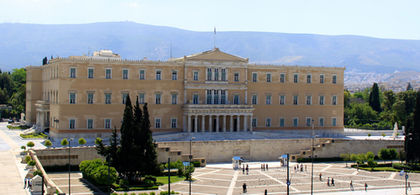Greece - Politics, government, and taxation

Greece is a presidential parliamentary republic. The Greek government is similar to the model found in many Western democracies, such as Germany. The prime minister and cabinet are responsible for making national and international policy. The president, whose powers are mostly ceremonial, is elected by parliament for a 5-year term and is eligible for reelection for only one additional term. His powers include declaring war and concluding agreements of peace, alliance, and representing Greece in international organizations. However, the cabinet must countersign any emergency powers exercised by the president. The constitution does not allow the president to dissolve parliament, dismiss the government, or suspend articles of the constitution.
Members of the Greek parliament are elected by secret ballot to 4-year terms; however, elections can be called before their term is up. To prevent political parties from dividing and to ensure there is always a parliamentary majority, Greece uses a complex proportional representation electoral system. A party must obtain at least 3 percent of the total national vote to qualify for parliamentary seats. As of 2001, there are 5 main political parties operating in Greece: the Panhellenic Socialist Movement (PASOK), New Democracy (ND), Political Spring, Communist Party of Greece (KKE), and the Coalition of the Left (SYNASPISMOS).
Greece is divided into 51 prefectures, each led by a "prefect" who is elected by direct popular vote. There are also 13 regional administrative districts (peripheries), which include a number of prefectures led by a regional governor, the periferiarch, who is appointed by the Minister of Interior. Although municipalities (a city with self-government and corporate status) and villages have elected officials, they do not have an adequate independent tax base and depend on the government for a large part of their financial needs. Accordingly, they are subject to numerous government controls.
Greece has had a rocky political experience since its independence, and has been jolted by a series of deposed (removed from power) leaders and a military coup d'etat. Soon after the civil war of 1944-49, Greece decided to align itself with the Western democracies and became a member of NATO in 1952. During the 1950s and early 1960s, Greece was ruled by a series of politically conservative parties. The Center Union Party of George Papandreou came to power in 1963 and remained in office until 1965.
Several weak coalition (multiple parties ruling together) governments ruled Greece after the Center Union-ists left office. Then in 1967 a coup occurred under the leadership of Colonel George Papadopoulos. The coup introduced a dark period in Greek politics. Many civil liberties were taken away, thousands of political protesters were jailed or exiled to remote islands, and military courts replaced civil courts. University students were politically active during the coup and staged an impressive protest at the Athens Polytechnic University in 1973. The international community did not support the military-led government and called for immediate free elections.
The military junta (a small group that rules a country after a coup d'etat) lost power in 1974 when its new leader, General Dimitrios Ioannides, tried to depose the president of Cyprus, nearly causing the outbreak of war between Greece and its long-time rival Turkey. The junta fell after Ioannides lost support from his senior military officials. Order was restored that same year when former prime minister Constantine Karamanlis returned to Greece from exile in France to lead a new constitutional government. His new political party, New Democracy (ND), won the 1974 elections and he became prime minister again.
A new constitution was adopted in 1975, which restored a number of civil liberties and created the Greek presidency. The New Democracy party stayed in power until 1981. Under their leadership Greece became the tenth member of the EU in January 1981. That same year Greece elected its first socialist government headed by the Panhellenic Socialist Movement (PASOK), which was led by Andreas Papandreou.
PASOK has dominated Greek political life since the 1980s. However, in 1990 the New Democracy party gained control of the parliament but collapsed in 1993 when several party members broke off and formed their own political party, Political Spring, and new elections were held after the collapse of the government. PASOK won elections in 1996 and 2000, and under Prime Minister Constantine Simitis's leadership, the economy has been revived and relations between Greece and Turkey have improved. Perhaps one of Simitis's greatest achievements is securing Greece's entry into the European Monetary Union in January 2001.
Since the 2000 elections, the PASOK government has improved social services by creating affordable pensions, improving health services and education, and creating better jobs while moving ahead with its privatization and economic policies. However, the PASOK government has become the target of growing criticism because of its recent strict reforms to ensure economic stability. PASOK emphasized meeting the criteria for low inflation and low public debt which are necessary for participation in the "euro zone"—those countries in Europe that will use the euro as a currency. The New Democracy (ND) party has accused the government of awarding large state contracts to friends of the party and favoritism in the sale of state assets, and the government is more cautious now when awarding contracts.
The Greek government employs a taxation system for revenue in which all persons permanently or temporarily residing in Greece, regardless of nationality, are required by law to pay taxes on their income. Sources of taxable income include real estate, securities, commercial and agricultural enterprises, and salaries. Additionally, corporations, companies, foreign construction companies operating in Greece, and ship owners are taxed.
Thank you
Brenda
Yours sincerely Annie M.